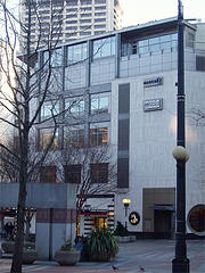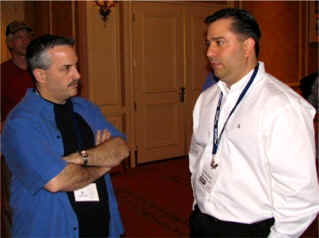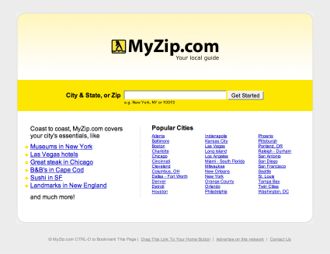|
Equipped
with this knowledge and the foresight to act on it, early domain
investors built portfolios of good generic domains and many went
on to make a very nice living by selling their traffic to Internet
advertisers. The fledgling industry flew under the radar for
years, dominated by “Lone Rangers” scattered around the world.
Seattle-based
Marchex, Inc. changed all of that and ushered in the
“modern era” of the domain industry early last year when they
closed on the $164 million purchase of the Name
Development portfolio (more commonly known by domainers as the
Ultimate Search portfolio), a collection of over 100,000
domains that had been assembled by an exceptionally savvy
domain pioneer named Yun Ye. That huge acquisition by a
publicly traded company (NASDAQ: MCHX) suddenly put the domain
business in the spotlight and attracted other major investors,
both public and private, who are now spending tens of millions of
dollars in this space.
|

Marchex
Offices in Seattle |
While
Marchex is now being challenged by other well-funded
competitors seeking to consolidate or “roll up” the
domain business, most experts say the company is well
positioned to fend off challengers because that bold $164
million stroke gave them the highest quality portfolio of
any of the new domain conglomerates. In addition, Marchex
has not sat still since acquiring those domains. They have
continued to add to their portfolio and are busy building
out many of their prime domains to further increase their
value.
Since
the domain business had been such a well kept secret, we
were curious to know who the people behind Marchex were,
how those principals had learned about the opportunity in
domains, what they have been doing since entering the
business and what they have planned for the future. The
company’s Chief Strategy Officer, Peter
Christothoulou, helped us fill in the blanks. |
“Prior
to founding Marchex, my colleagues and I were among the primary
senior management team of a publicly traded internet company, Go2Net,
which focused on consumer search, as well as merchant
transactions,” Christothoulou said. We held similar positions at
Go2Net to which we hold now at Marchex - Russell Horowitz
is the Chairman and Chief Executive Officer; John
Keister is the President and Chief Operating Officer;
Ethan Caldwell is the Chief Administrative Officer
and General Counsel; and I am the Chief Strategy Officer.
After Go2Net’s merger with InfoSpace in 2000, we
incorporated Marchex in 2003 and we are all here today and
committed to growing Marchex.
164
million seeds for future growth were planted with the landmark
deal for the Name Development portfolio. At the time those domains
were purchased, they were reportedly generating about $19
million a year in revenue. That worked out to a price of about
8.6 times annual revenue, but with real content added to
many of their domains and advertising dollars migrating to the
Internet from traditional media, Marchex is expected to recoup
their initial investment in a much shorter time frame.
“The
Name Development transaction surprised a lot of people because it
was the first transaction of its type and by the sheer magnitude
of the deal,” Christothoulou said. “By virtue of Marchex’s
third party distribution network, which partially consisted of
domain portfolio owners, we had been fortunate enough to see the
operational characteristics and financial trends of these assets,
including the high quality traffic (defined as high advertiser
conversion rates) and strong growth rates they generated on a
consistent basis.”
| “This
market was characterized by a simplistic yet valuable
early-stage business model (a simple Web page with
pay-per-click search results), but was missing product
vision. In our discussions with all of the major portfolio
holders, we recognized that if we were able to secure the
right portfolio, we had an opportunity to help further
define and potentially lead the evolution of what was and
is, in many ways, a new and complementary segment of the
Search market.”
“Since
domains are effectively search keywords, we believed there
was an opportunity to evolve the product and create a
network of very relevant, multi-page Web sites which
contained a combination of content (information), tools
(search refinements, related Web site suggestions, maps,
etc.) and advertising - effectively a specialized media
portal for a specific search term,” Christothoulou said. |

Marchex
General Manager Andy Smith (right)
speaking with iREIT President Marc Ostrofsky
at 2005 T.R.A.F.F.I.C. conference in Las
Vegas. |
“In
addition, because of our large base of search advertisers who were
purchasing pay-per-click and contextual advertisement listings, it
was important to secure a direct source of proprietary high
quality distribution that, as is commonly known, helps to increase
overall advertiser conversion rates. In
short, the deal was a great fit for our search marketing products
and services. The transaction would not have been as effective or
compelling absent those assets.”
Yun
Ye’s portfolio was not the only large portfolio Marchex could
have gone after. Christothoulou explained why it was the one they
set their sites on. “As most people know, domain name quality is
a big differentiator. We selected the Name Development portfolio
based primarily on the quality and quantity of its holdings: tens
of thousands of generic, commercially relevant Web sites in key
commercial verticals (for example, travel, finance, health, etc.).
Given a choice between 100,000 high quality sites and a million
sites that lack the characteristics we think are important,
we’ll opt for the 100,000 sites every time. We carefully
evaluated a wide range of options in the marketplace based on
specific criteria that we had established internally, found that
the Name Development portfolio was, by a wide margin, what we
believed to be the best portfolio in the space and commenced our
process.”
 |
Today
there are several entities that hold portfolios of 100,000
or more domains. With new competitors in the space, we
asked Christothoulou if it is more difficult now to
acquire domains that are similar in quality to those
Marchex already holds? “Our
current focus is less on acquisitions and more on product
development (building out the Web sites). As such, the
current environment doesn’t really affect our business.
It does, however, validate the value of our Web sites and
our strategy,” he said. |
“Each
domain is a unique asset – so while others may look to get
similar names, there can only be one Remodeling.com,
one BayAreaHotels.com,
one Beijing.com,
one Cuisine.com,
etc. – which are names Marchex owns. Additionally,
because our strategy involves “verticalizing” our Web sites
(for example, hotels.beijing.com, restaurants.beijing.com, etc.)
and “localizing” our Web sites (for example,
seattle.remodeling.com, newyork.remodeling.com, etc.) with the
creation of sub-domains or sub-pages, we have the opportunity to
create additional valuable inventory at very little incremental
cost. In other words, if we didn’t purchase another domain, we
would have the opportunity to continue to grow our business by
making our existing Web sites deeper (multi-page Web sites), which
is unique to Marchex by virtue of the way in which we power our
Web sites by leveraging our Open List technology to
populate the pages with relevant information,” Christothoulou
said.
Open
List is a company Marchex acquired
for $13 million in May that provided them with a
user-generated content platform as well as content aggregation and
search technology they have been able to apply to their sites.
“Open List has helped to unlock the value of our Web sites by
providing us the ability to dynamically build very deep,
multi-page Web sites with targeted content,”
Christothoulou said.
| “Our
strategy involves aggregating consumers that are searching
for products or services and providing them with
personally relevant information, which means that we
leverage our Web sites to attract users who have
commercial intent (for example, users who are making a
purchase decision, such as finding a hotel and booking a
reservation); and two, helping merchants put the most
effective ads in the most effective places, which means
that we use our proprietary search marketing technologies
(pay-per-click and contextual) to place advertiser
listings in the places where they can achieve high
return-on-investment, including our vertical and local Web
sites.” |

|
“Since
our inception almost four years ago, we have grown very quickly
and have made strong operational and product progress. We own a
proprietary source of vertical and local traffic which generated
approximately 28 million monthly unique visitors for the
month of June 2006, we have partnerships with hundreds of
distribution partners, including many of the leading search
engines (such as Google and Yahoo), shopping engines
(such as Shopping.com and PriceGrabber.com) and
vertical Web sites (such as BusinessWeek.com and Forbes.com),”
Christothoulou said. “We also have an advertiser base that
consists of tens of thousands of merchants who leverage our search
marketing technology to sell their products online – on our
proprietary traffic and on our third party distribution partner
traffic.”
Wall
Street has taken notice of the strides Marchex has made. Motley
Fool writer Rick Aristotle Munarriz posted a glowing
review of the company’s second quarter 2006 results.
Christothoulou said “We reported second quarter revenue of $31.7
million, a 50% year-over-year increase and we are
projecting 2006 revenue of $130 million to $136 million.
We are cash-flow positive and reported Adjusted Operating Income
Before Amortization (Adjusted OIBA) and Adjusted Earnings Before
Interest, Taxes Depreciation, and Amortization (Adjusted EBITDA)
of $8.3 million and $9.7 million, respectively, for
the second quarter of 2006.”
“It
is important to know that our reported ‘loss’ in the second
quarter is due to non-cash accounting items (accounting
regulations that took effect in 2006), such as stock-based
compensation and amortization of acquired intangible assets, and
that Marchex continues to generate cash in a very meaningful way. For
the second quarter of 2006, we reported Adjusted Earnings per
Share of $0.12, which compares to $0.08 per share a
year ago. We feel good about our progress thus far and are
squarely focused on continuing to build the business.”
|

Screen shot
from
MyZip.com
|
One
Marchex project that has drawn a lot of attention is their
development of thousands of local content sites based on .com
or .net domains that represent most American ZIP
codes (see 90210.com
for example). They also have a central portal to the ZIP
network at MyZip.com.
In
addition to the numerical domains, Marchex has built up a
huge stable of names that focus on specific geographical
areas.
“Our
ZIP code and local strategy was developed even before our
acquisition of Name Development,” Christothoulou said.
“We believed that the announcement of the Name
Development transaction would change the playing field in
the industry and create more competition for high quality
names. So it was in our best interest to understand what
other names were out there that would be appropriate for
Marchex prior to a transaction announcement.” |
“Fortunately,
Marchex was, and is, uniquely qualified to perform this analysis.
We have tens of thousands of advertisers who use Marchex’s
technology for search marketing – so we see the patterns of
keyword bidding (which keywords are being bid for and at what
frequency or volume); the trends in keyword bid prices and the
conversion rate for keywords (which keywords tend to drive high
advertiser conversion). As such, we applied data mining techniques
to that information and ran the resulting keyword list against the
registry.”
“Of
course, we knew that many valuable names, like Cars.com would be
taken, but what we found was that locally focused names were not
registered. Things like local and vertical combinations, such as ChicagoDoctors.com,
BayAreaHotels.com,
MiamiTours.com,
as well as ZIP Codes. So, fortunately, we were able to directly
register these names at wholesale rates and acquire more than
100,000 locally and vertically focused Web sites in the process.
Our strategy has paid off nicely, as many of these names have
become very powerful Web sites for Marchex,” Christothoulou
said.
| The
company’s ZIP code network has already drawn one
competitor. Neustar,
the .US registry, formed a partnership with Vendare
Media and has quietly rolled out their local
information network that includes every single American ZIP
code in the .US extension. Check any ZIP code, (for
example, the one for our Tampa, Florida office, 33625.us),
and you will see what they have started doing. More local
content is to be added to the sites and the registry
expects the network to significantly increase .us
recognition. The registry had reserved all 5-number
domains from the beginning, so they owned the complete set
when the deal was struck with Vendare to handle the
development. |

|
Christothoulou
doesn’t expect the .US effort to have a material impact on the
Marchex ZIP code network. “We have found that the majority of
Internet users navigate the Web using .com or .net, and we feel
fortunate to have acquired the majority of ZIPs in those areas.
Additionally, the challenge of building out relevant Web sites,
increasing Web site utility and promoting repeat usage at the ZIP
Code level is in finding an efficient way to populate the pages
with geo-specific content on a wide range of topics, such as
hotels, restaurants and attractions. Fortunately, Open List
allows us to accomplish this type of integration and we are happy
with the results we have seen to date on our ZIP Code Web sites.
It will be interesting to watch what happens with this other
effort and how they answer the challenge of creating deep, rich
Web sites that benefit both consumers and advertisers,”
Christothoulou said.
While
the ZIP code battle unfolds, Marchex is continuing to build out
dozens of other locally oriented sites. “We have initially
focused on content integrations in the travel vertical, with
sub-categories in hotels, restaurants, and attractions – meaning
that we’ve deployed Open List to all of our ZIP Code sites and
more than 100 local and vertical Web sites, such as LasVegasVacations.com,
ShanghaiHotel.com,
and NewYorkTours.com.
In the coming months, we will extend our Open List platform to
additional verticals and sub-categories,” Christothoulou said.
“Initial feedback has been very encouraging. In August, we announced
that the initial integrations of Open List content and
technologies into a sample base of our Web sites have led to
very impressive growth in page views and revenue."
 |
As
a new industry that is still being shaped, the rate of
change in the domain business has been phenomenal. We
asked Christothoulou how he thought things might change over the
next 2-3 years? “We believe that there will
continue to be a combination of new players and some
consolidation, as is the case with any emerging industry.
Things are moving quickly, with new participants emerging
on a seemingly daily basis. As the industry continues to
mature, we believe that marketplace expectations for
quality will increase, too. The participants who want to
have staying power need to keep focused on quality, while
understanding that larger, traditional media companies
just might get involved in the space, too. It will be
interesting to watch and is an exciting time to be
involved,” Christothoulou said. |
In
closing, Christothoulou noted “The industry is still very young.
As is often the case with any early market, its participants need
to not only focus on successfully running their business, but also
on educating third parties, including the press and Wall Street.
It is important that we all continue to work diligently and
explain this marketplace in a manner that highlights the benefits
we provide in the context of the search ecosystem.”
|























